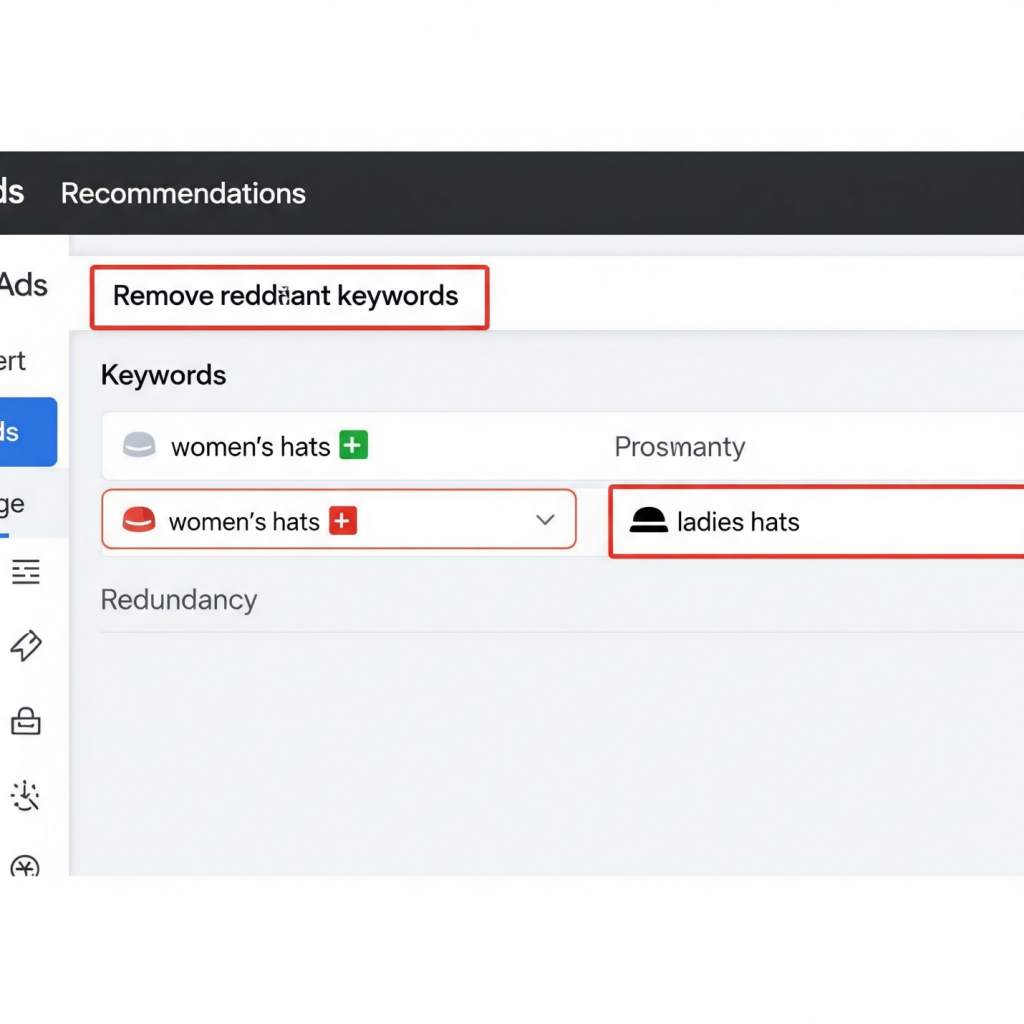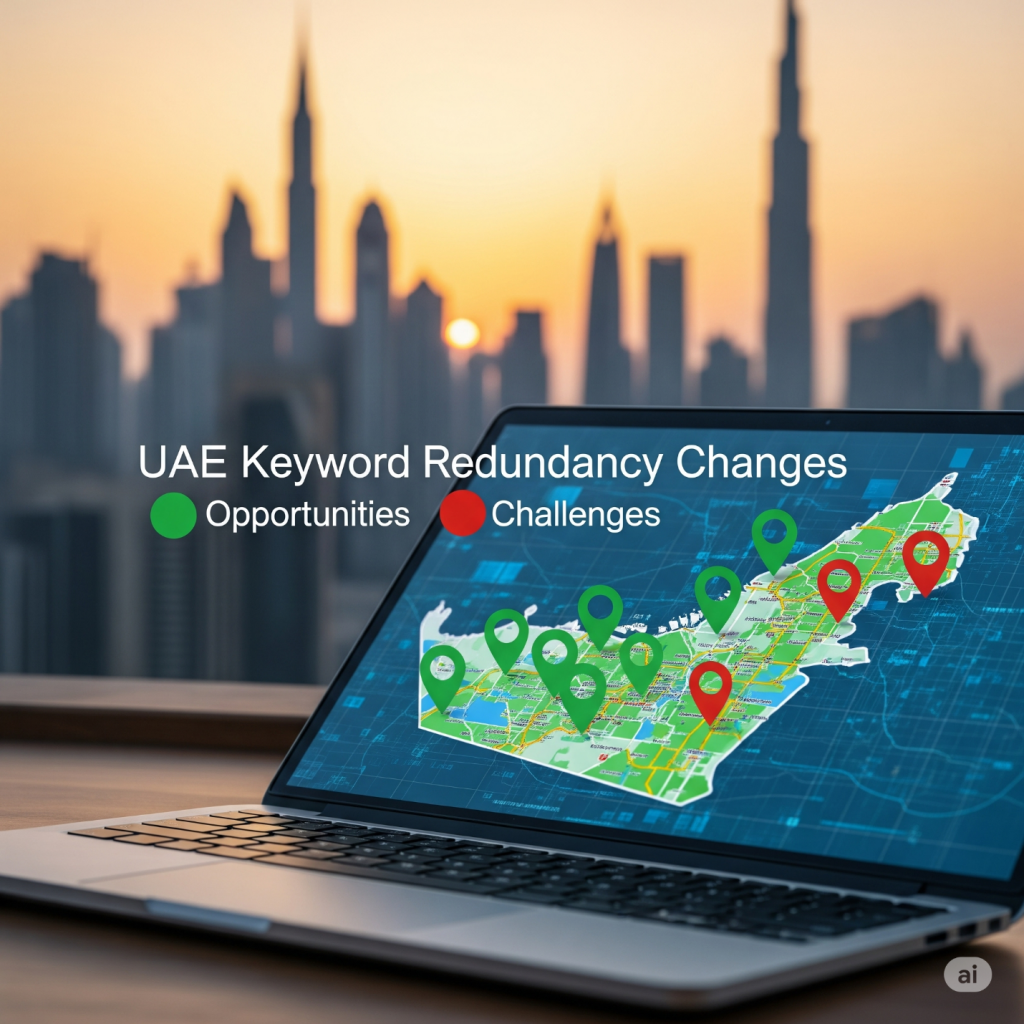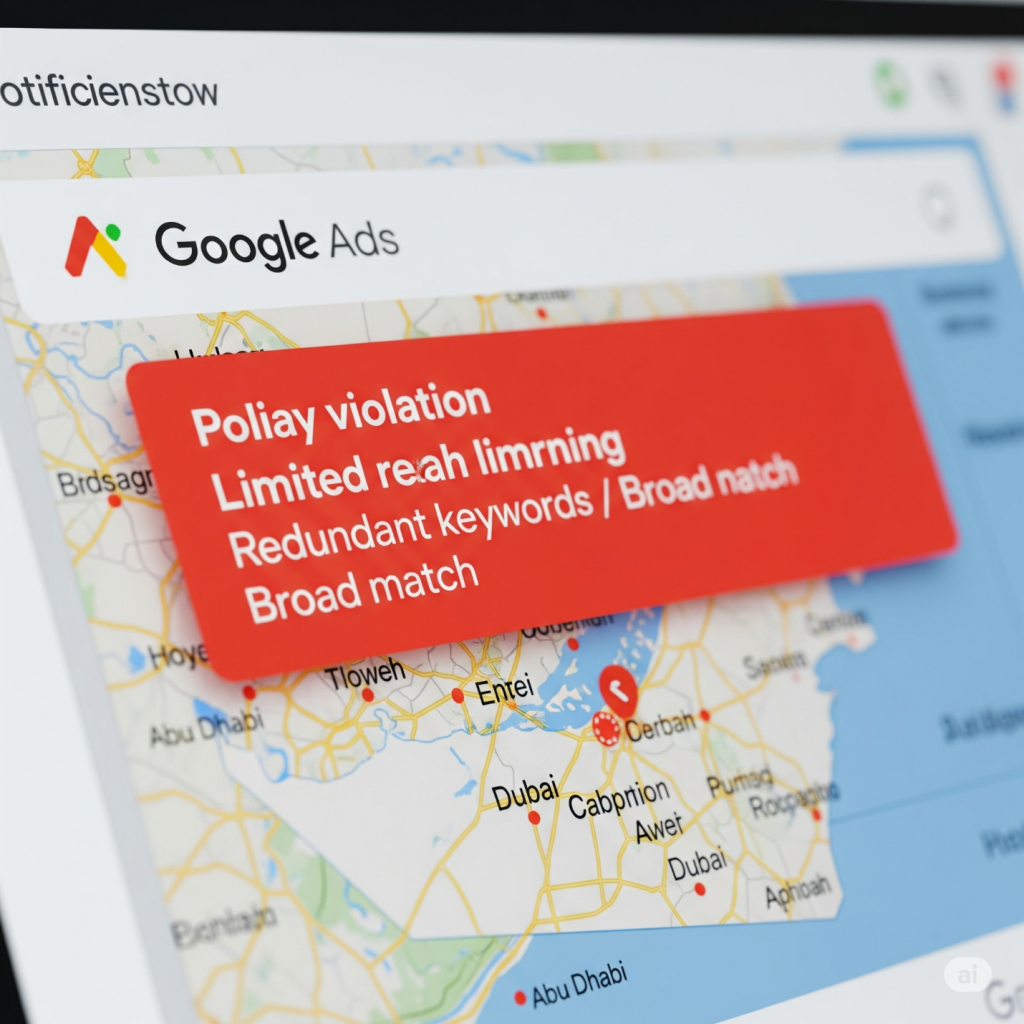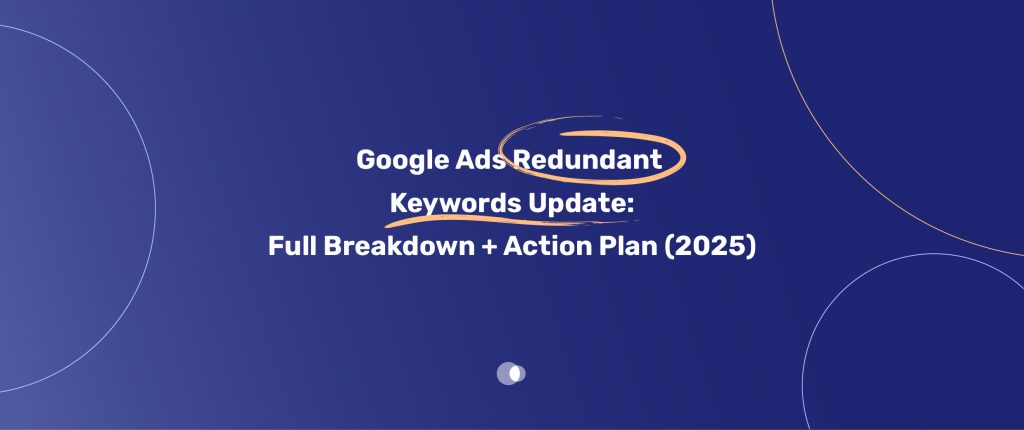When Google Ads rolled out its Google Ads Redundant Keywords Update in January 2023, it sent shockwaves through the digital marketing world. This policy, still shaping campaigns in 2025, redefined how the platform handles keyword redundancy, pushing advertisers toward broad match keywords at the expense of phrase and exact match precision.
Table of Contents
For businesses in Dubai, where every click counts in a fiercely competitive market, this shift is both a challenge and an opportunity. Whether you’re partnering with a Google Ads agency UAE or managing AdWords management Dubai, mastering this update is non-negotiable to keep your campaigns sharp and your budgets intact.
This guide dives deep into the Google Ads Redundant Keywords Update 2025, unpacking its mechanics, impacts, and a step-by-step action plan to thrive in this AI-driven landscape. From navigating auto-applied recommendations to leveraging Performance Max enhancements, we’ll cover everything you need to optimize campaigns, avoid costly missteps, and seize new opportunities for AdWords optimization.
With practical tips tailored for UAE advertisers, let’s explore how to stay ahead in 2025.
Understanding the Google Ads Redundant Keywords Update
Launched on January 19, 2023, the Google Ads Redundant Keywords Update transformed the platform’s “Remove redundant keywords” recommendation, a change that remains pivotal in 2025. Previously, Google only flagged duplicate keywords within the same ad group, match type, destination, and bidding strategy—like two exact match keywords for “luxury watches Dubai.”
Now, the system takes a bolder approach, identifying phrase or exact match keywords as redundant if a broad match keyword in the same ad group can theoretically cover the same search intent.
For instance, imagine a Dubai jeweler running an ad group with the phrase match keyword “diamond rings Dubai” and the broad match “jewelry UAE.” Google’s algorithm, powered by advanced semantic matching, might recommend removing the phrase match term, arguing that “jewelry UAE” captures all relevant searches.
This reflects Google’s broader push toward AI-driven, intent-based targeting, prioritizing broad match and automation over granular control. For advertisers seeking AdWords optimization, this shift demands a rethink of keyword strategies, especially in precision-driven markets like the UAE.
Key Changes in the Update
- Cross-Match-Type Removals: Google now suggests eliminating phrase or exact match keywords in favor of broad match terms, even if they target nuanced queries.
- AI-Powered Intent Matching: The system uses machine learning to assess keyword redundancy based on user intent, not just literal text, analyzing historical search data and contextual signals.
- Auto-Apply Controversy: Advertisers with auto-applied recommendations enabled faced automatic keyword removals, sparking backlash for eroding campaign control without consent.
- Evolving Match Types: Exact match now triggers ads for searches with similar intent (e.g., “car rental Dubai” matching “hire a car UAE”), while phrase match behaves more like broad match, blurring traditional boundaries.

Implications for Advertisers
The update reshapes campaign management, posing both risks and opportunities, particularly for UAE advertisers working with an international AdWords agency or those new to buy Google Ads account. Here’s a detailed look at its impact:
Erosion of Granular Control
With exact and phrase match types behaving more like broad match, advertisers lose precision over search query matches. A Dubai real estate firm using exact match “villas for sale Dubai” might see ads triggered for “apartments UAE,” diluting relevance and attracting less qualified leads.
This shift forces reliance on post-impression tools like search term reports and negative keywords to filter traffic, increasing workload for AdWords management in Dubai.
Auto-Apply Pitfalls
Advertisers who enabled auto-apply before 2023 may have lost critical keywords without warning, disrupting campaign performance. Small businesses or beginners, often reliant on automation, are hit hardest.
For example, a Dubai café targeting “coffee shop Jumeirah” might lose this phrase match term to a broad match “café UAE,” reducing local relevance. A Google Ads agency UAE can audit and reverse such changes to restore control.
Budget Efficiency Risks
Broad match keywords, Google’s preferred choice, cast a wider net, potentially driving irrelevant clicks. In Dubai’s high-stakes market, where CPCs for terms like “luxury hotels” can exceed $6, this risks budget waste.
Without robust negative keyword strategies, campaigns may bleed funds on low-intent searches, undermining AdWords optimization efforts.
Streamlining Opportunities
For savvy advertisers, the update offers a chance to simplify account structures. By consolidating redundant keywords and leveraging AI tools like Smart Bidding, campaigns can focus on high-intent queries, improving quality scores and reducing clutter.
A Dubai travel agency, for instance, could streamline ad groups around core themes like “Dubai vacation packages,” enhancing efficiency.
Performance Max Integration
The update aligns with enhancements in Performance Max (PMax) campaigns, which now support up to 10,000 negative keywords and brand exclusions. This allows advertisers to refine AI-driven targeting, making PMax a viable option for UAE businesses seeking broader reach without sacrificing precision.
| Impact | Description | Action Required |
| Loss of Precision | Match types trigger broader queries | Audit search terms, add negatives |
| Auto-Apply Disruptions | Unintended keyword removals | Disable auto-apply, review changes |
| Budget Waste | Broad match attracts irrelevant clicks | Monitor CPC, refine negative keywords |
| Streamlined Structure | Chance to simplify ad groups | Consolidate keywords, test AI tools |
| PMax Opportunities | Enhanced controls for AI-driven campaigns | Use brand exclusions, search themes |

Strategic Best Practices for 2025
To master the Google Ads Redundant Keywords Update 2025, advertisers must blend Google’s automation with strategic oversight. Here’s a robust action plan, with UAE-specific insights for AdWords management in Dubai:
Disable Auto-Apply Recommendations
Turn off the “Remove redundant keywords” auto-apply setting to prevent unintended removals. In Google Ads, go to Recommendations > Auto-apply and toggle it off.
For UAE advertisers managing multiple accounts, a Google Ads agency UAE can streamline this process, ensuring no critical keywords are lost.
Conduct a Comprehensive Keyword Audit
Review ad groups to identify keywords removed since January 2023. Use the Keywords tab and historical performance data to reinstate high-performing phrase or exact match terms, like “luxury apartments Dubai” for a real estate campaign. This restores precision lost to automation, crucial for Dubai’s competitive market.
Optimize Account Structure
Limit ad groups to 15-20 keywords, grouped by intent (e.g., “Dubai spa services” vs. “massage UAE”). Avoid excessive match type variations for the same term to align with Google’s intent-based matching.
For AdWords optimization, create Dubai-specific ad groups targeting neighborhoods like Business Bay or Marina.
Strengthen Negative Keyword Strategies
Regularly analyze the Search Terms Report to spot irrelevant queries triggered by broad match keywords. Add negative keywords at campaign and ad group levels, leveraging PMax’s 10,000 negative keyword limit.
For a Dubai retailer, exclude terms like “cheap” or “used” to attract premium customers.
Test Broad Match with Smart Bidding
Cautiously test broad match keywords in campaigns with robust conversion data and Smart Bidding (e.g., Target CPA or ROAS). Start with high-intent terms like “car rental Dubai” and monitor performance closely.
In emerging UAE markets like Sharjah, broad match can uncover new opportunities if paired with negative keywords.
Maximize Performance Max Capabilities
Implement brand exclusions and search themes in PMax to guide AI targeting. For a Dubai hotel chain, exclude branded terms like “yourhotel Dubai” to focus PMax on non-branded traffic.
Use the expanded negative keyword limit to refine reach, ensuring ads align with campaign goals.
Monitor Performance Relentlessly
Track metrics like CTR, CPC, and conversion rate weekly. Set alerts for spend spikes indicating broad match overreach. Use Google Analytics to analyze query relevance and refine landing pages.
An international AdWords agency can provide real-time monitoring for UAE campaigns, ensuring agility in a dynamic market.
Stay Ahead with Continuous Learning
Follow Google Ads Help Center and industry blogs for updates on AI-driven features like Smart Bidding Exploration. Test new tools methodically, assessing their impact on Dubai-specific campaigns.
Staying informed keeps you competitive in the UAE’s fast-evolving advertising landscape.

Challenges and Solutions
The Google Ads Redundant Keywords Update 2025 presents significant hurdles for advertisers, particularly those navigating the competitive UAE market or new to buy Google Ads account. Below is a comprehensive table outlining key challenges and actionable solutions, tailored for Google Ads management in Dubai to ensure campaign success.
Loss of Keyword Precision
Intent-based matching causes exact and phrase match keywords to trigger broader, less relevant queries. For instance, a Dubai retailer’s exact match “luxury watches Dubai” may match “cheap watches UAE,” reducing ad relevance.
Solution:
Analyze the Search Terms Report weekly to identify irrelevant queries. Add negative keywords to block low-intent searches and prioritize phrase match for high-intent terms. Cross-check landing page alignment with targeted queries.
UAE-Specific Tip:
Exclude terms like “affordable” or “second-hand” for premium Dubai campaigns, focusing on high-net-worth areas like Emirates Hills. Work with a Google Ads agency UAE to refine targeting.
Auto-Applied Keyword Removals
Auto-apply recommendations may have silently removed critical keywords, disrupting campaign structure. A Dubai spa targeting “massage Jumeirah” might lose this term to a broad match “wellness UAE.”
Solution:
Disable auto-apply in Recommendations > Auto-apply. Audit historical keyword changes via the Keywords tab and reinstate high-performing terms. Engage a Google Ads agency UAE for a thorough review.
UAE-Specific Tip:
UAE businesses with pre-2023 accounts should prioritize audits, as auto-apply was common. Restore local terms like “Dubai yacht rental” for precision with AdWords optimization.
Budget Waste from Broad Match
Broad match keywords drive irrelevant clicks, inflating costs. In Dubai, CPCs for “luxury cars” can hit $7, with broad match terms like “cars UAE” attracting low-intent searches like “used cars Sharjah.”
Solution:
Test broad match with strict daily budgets and Smart Bidding (e.g., Target ROAS). Add negative keywords aggressively from Search Terms Report. Set alerts for CPC or impression spikes.
UAE-Specific Tip:
For Dubai’s luxury sector, exclude “budget” or “rental” to attract high-value clicks. Use Google Ads management Dubai services to cap exploratory campaign spends.
Complexity of Performance Max
PMax’s AI-driven approach risks irrelevant placements or branded search cannibalization, overwhelming advertisers with its “black box” nature.
Solution:
Implement brand exclusions, search themes, and the 10,000 negative keyword limit to refine targeting. Monitor Search Terms Report for PMax and test feed-only vs. asset-based campaigns. Use asset group reports for device-specific insights.
UAE-Specific Tip:
Dubai retailers should exclude branded terms like “yourbrand Dubai” and use search themes like “luxury fashion UAE” to target high-intent shoppers in malls like Dubai Mall.
Adapting to AI-Driven Tools
Google’s AI tools (e.g., Smart Bidding Exploration, AI-generated ad copy) are complex, especially for small businesses or those new to buy Google Ads account, risking misconfiguration.
Solution:
Stay updated via Google Ads Help Center and test AI tools with small budgets. Use portfolio bidding for single campaigns to cap CPC while targeting CPA. Consult an international AdWords agency for training.
UAE-Specific Tip:
UAE startups should join Dubai-based Google Ads workshops or hire a Google Ads agency UAE to integrate AI tools for campaigns targeting sectors like tourism or real estate.
Time-Intensive Monitoring
Frequent search term analysis and negative keyword updates demand significant time, challenging advertisers with limited resources.
Solution:
Schedule weekly Search Terms Report reviews and automate alerts for spend or impression spikes. Outsource monitoring to a Google Ads agency UAE. Use Google Ads Editor for bulk negative keyword management.
UAE-Specific Tip:
Dubai businesses can delegate monitoring to Google Ads management Dubai services, freeing up time for strategic planning in high-CPC sectors like hospitality.
Irrelevant PMax Placements
PMax may serve ads on low-value Display Network placements or irrelevant searches, wasting budget on unqualified audiences.
Solution:
Apply demographic exclusions (e.g., ages 18-24) and “URL contains” rules when available. Add campaign-level negative keywords to block unsuitable placements. Review asset group reports for placement performance.
UAE-Specific Tip:
For UAE luxury brands, exclude gaming apps or budget sites to align with premium audiences in Dubai and Abu Dhabi. Use AdWords optimization to refine PMax placements.
Lack of Trust in Google’s Recommendations
Advertisers distrust Google’s auto-recommendations post-update, suspecting revenue-driven motives over ROI, especially after the controversial 2023 change.
Solution:
Manually review all recommendations, cross-checking with performance data and business goals. Seek objective advice from an international AdWords agency to validate suggestions.
UAE-Specific Tip:
UAE advertisers should align recommendations with local market trends, ensuring relevance for sectors like real estate. A Google Ads agency UAE can provide unbiased audits.
Impact on Small Businesses
Small UAE businesses, often reliant on automation, face disproportionate risks from auto-removals and broad match inefficiencies, lacking resources for manual oversight.
Solution:
Disable auto-apply and simplify ad groups to 10-15 keywords. Use negative keyword lists to maintain relevance. Partner with a Google Ads agency UAE for affordable management.
UAE-Specific Tip:
Dubai SMEs, like local cafés, should focus on hyper-local terms like “coffee shop Deira” and use Google Ads management Dubai services for cost-effective support.
Evolving Match Type Convergence
The blurring of exact, phrase, and broad match types complicates campaign planning, as traditional strategies become obsolete.
Solution:
Shift to intent-based keyword grouping, using fewer keywords per ad group (10-15) and robust negative lists. Test broad match cautiously with Smart Bidding for new query discovery.
UAE-Specific Tip:
For Dubai travel agencies, group keywords by intent (e.g., “luxury tours Dubai”) and exclude irrelevant intents like “budget travel” to maintain precision.

Conclusion: Seizing Control in 2025
The Google Ads Redundant Keywords Update 2025 is a double-edged sword: a push toward AI-driven simplicity that risks precision without careful management. For UAE advertisers, where competition is cutthroat, mastering this update is essential to drive relevant traffic and protect budgets.
By disabling auto-apply recommendations, auditing keywords, leveraging negative keywords, and embracing Performance Max enhancements, you can turn challenges into opportunities.
Whether you’re a small business exploring buy Google Ads account or a brand partnering with a Google Ads agency UAE, success hinges on blending Google’s AI with human expertise.
Continuous monitoring, local insights for AdWords management in Dubai, and proactive adaptation will ensure your campaigns not only survive but dominate in 2025’s dynamic advertising landscape.



